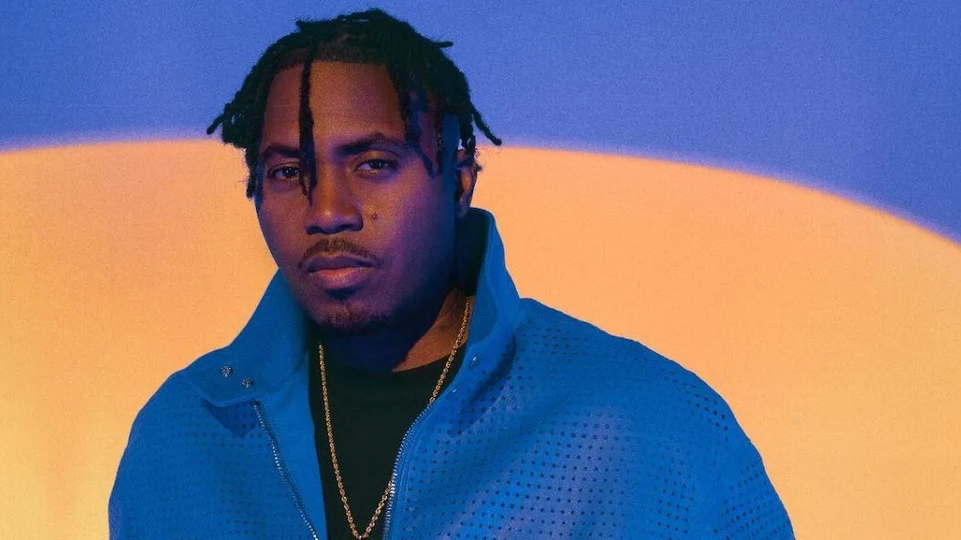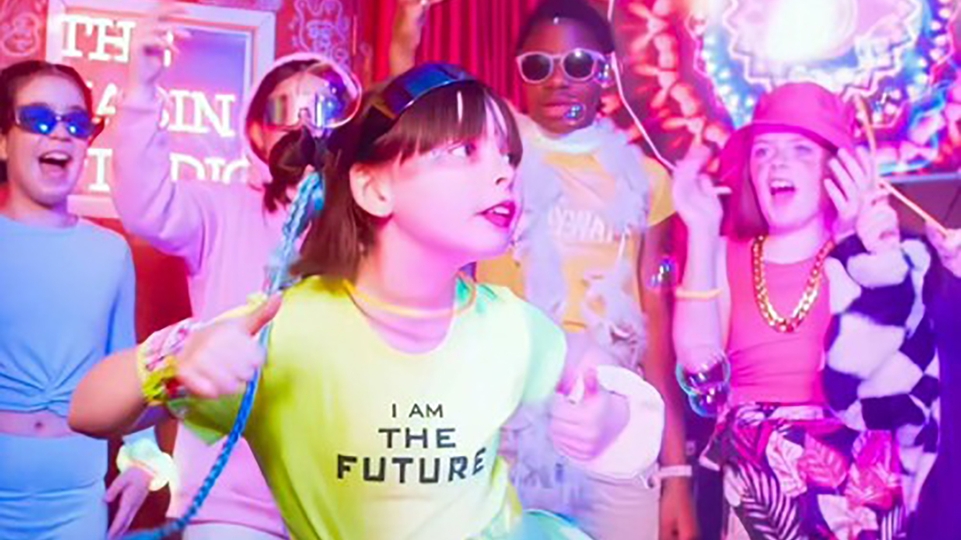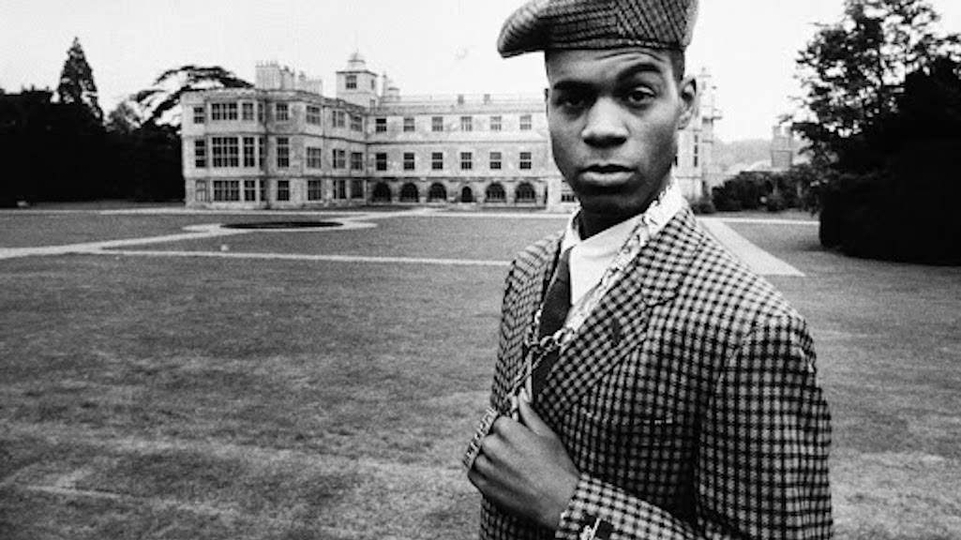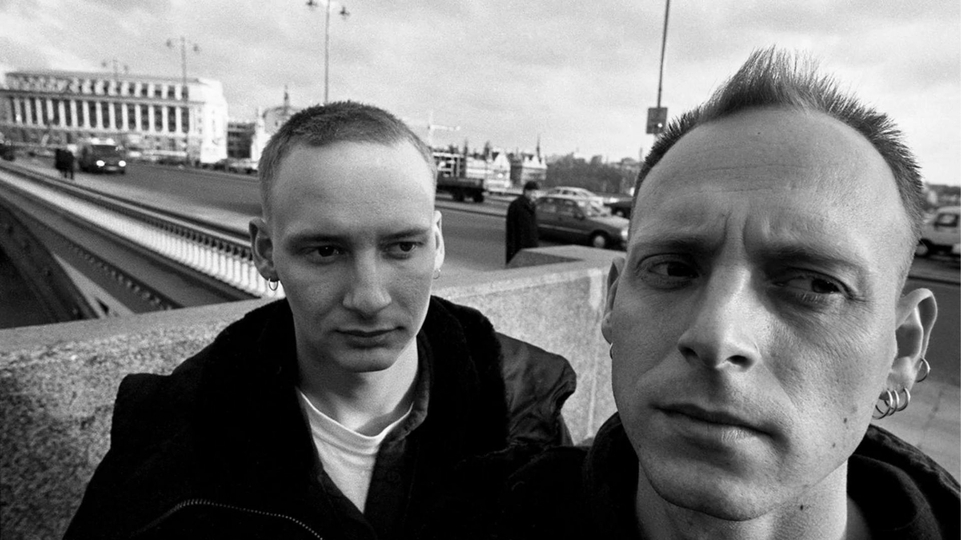
Kneecap: for the culture
Belfast’s Irish language rap trio Kneecap have created a serious buzz with their fiery, politically-attuned lyrics and chaotic live shows. Their Toddla T-produced debut album, ‘Fine Art’, and forthcoming feature film are set to catapult them even further onto the global stage. But as Brian Coney learns, their commitment to their native tongue, doing things their own way, and reshaping the narrative of modern Belfast remains their top priority
"I think we have a weird kink for making things really hard for ourselves," says Móglaí Bap, seated with his fellow Kneecap members Mo Chara and DJ Próvaí in the café of the Irish language cultural centre, Cultúrlann McAdam Ó Fiaich, in the heart of West Belfast. "We started rapping in Irish, a language nobody understands," he adds. "Now we’ve made an album where we mix as many genres as possible, when it would have been much easier if we just did one thing."
Above the bustle of coffee steamers and locals catching up "as Gaeilge," or in Irish, the rap crew are grabbing a rare breather to reflect on their long-awaited debut album, 'Fine Art'. Freshly back from Paris, where they shared a bill with Mount Kimbie and partied with King Krule, the trio are still coming down from packing out venues across the States earlier in the year.
"What we’ve learned from touring over there is to stay away from the Irish pubs," says Móglaí Bap, chatting over breakfast as a traditional folk song fills out the room. "They see us and offer us everything we’ve ever wanted for free. When you come from our culture, and a working-class background, it’s very hard to turn down anything free. But you have to pick your battles."
Since their emergence in 2017 with "C.E.A.R.T.A" (the Irish term for "rights", namely human rights), Kneecap's incisive, politically-attuned hip-hop has incurred its fair share of battles. Criticism has arisen domestically for their murals and merchandise, which confront their upbringing amidst the enduring cultural backwash of a 30-year civil conflict. Yet, for every critic unable, or unwilling, to grasp the nuance of their craft, they've gained a litany of supporters. Whether fluent Irish speakers or not, fans are all in as they level up from genre-flipping disruptors to contenders on the global stage.
A worthy one-track primer for newcomers is their 2019 track ‘Get Your Brits Out’. Over searing bombast, Móglaí Bap spits: “Guess who's back on the news, it's your favourite Republican hoods/It's your fella with the Nike Air shoes.” By owning the weekly ritual of getting blitzed with good heads in Belfast, no matter their background, Kneecap play their detractors at their own game. Blending Irish and English seamlessly, it distils how their music is about the goal of freedom from the ghosts of the past and the monotony of the everyday, above all else.

"We’re constantly trying to go to places Irish music has never been. The chaos of our live show was the main point of reference, but by going between a punk song to a garage track, we tried to show that the Irish language can work anywhere.” – Mo Chara
‘Fine Art’ is an album that expertly advances that mission. Produced by Tom Bell, more commonly known as Toddla T, the trio’s debut full-length may not sway those intent on criticism, yet it’s a quantum jump by the most promising Irish language group of a generation. The cadence of their native tongue, delivered in straight-up Belfastian, remains central to their approach. Now they boast the feature-length product, and production values, to match the vision.
A pure-cut concept album, ‘Fine Art’ unfolds within the confines of The Rutz, an imaginary bar nestled in the heart of West Belfast. Representing the dizzying theatre of a community boozer where the entire community converges, it’s a perfectly-pitched patchwork from the first sip to the haze of home time. He may be Sheffield through-and-through, but Toddla T was instrumental in summoning this singular slice of Belfast life.
“He really invested himself,” says Mo Chara, which translates to “my friend” in English. “He took the initiative to find and watch documentaries about Belfast and everything. That level of care made him really easy to work with. His wife [Annie Mac] is Irish as well, which obviously helps.”
“It was important for him to know our reality, and we wanted to represent our culture, which is so steeped in impromptu live music,” adds Móglaí Bap, real name Naoise Ó Cairealláin. “You go to the pub, where there’ll usually be traditional folk music playing. You’ll then go and bang out a load of coke in the toilet with some lad you’ve just met, then you’ll head back out where there’s some woman now singing sean-nós (or unaccompanied vocal performance in the Irish language). It’s nothing out of the ordinary.”
Make-believe or not, the shifting energies of The Rutz mirror the album’s shapeshifting sound. Between its walls, numerous visitors, including heavy hitters in contemporary Irish music, double as collaborators. Fontaines D.C. frontman Grian Chatten contributes verses about transcending the ordinary on the slinking ‘Better Way To Dance,’ while the trap-inspired opener ‘3CAG’ showcases the singular vocals of Radie Peat from Dublin experimental folk heroes Lankum. “She sang her lines and jumped straight in the taxi to the airport to go on holiday,” reveals DJ Próvaí, curiously unrecognisable without his trademark Irish tricolour balaclava.
As Irish folk and indie artists duly get their flowers on the world-stage, Kneecap underscore their status as a DJ and two MCs marching to the beat of their own 808. Whether on the pummelling drum & bass of 'I'm Flush’, the peak garage of ‘Love Making’, or ‘Sick in the Head’, an old skool blitz beginning with Móglaí Bap riffing, "Two bags of street is the same price as an hour with a therapist, no one wonder we're all fucked up,” they kick against neat categorisation.
"I think, stereotypically, you would probably think with it being based in an Irish pub it would be a lot of traditional music,” says DJ Próvaí. “But because we did such a wide scope of stuff, it organically became something else.” “There’s a ton of great folk at the moment, but we’re constantly trying to go to places Irish music has never been,” adds Mo Chara. “The chaos of our live show was the main point of reference, but by going between a punk song to a garage track, we tried to show that the Irish language can work anywhere.”
Their ancient language remains the central axis around which Kneecap’s universe lights up. While a basic grasp of the language won’t hurt, tracks like 'Ibh Fiacha Linne’ (“Our Debts”) are wielded with a flair that feels unmistakably for everyone. At the same time, a medley of impromptu skits in English help foster connection. “Often if we were sitting there chatting and laughing in the studio, T would quietly hit record on a mic in the corner of the room,” says Mo Chara. “The result is a lot of different conversations in the room, panned left and right throughout the album, which I think adds something.”

“We didn't want a movie that depicts us as three stupid working-class fellas bumping into each other and fumbling through life. We didn’t want it to be cringy or silly. We wanted to represent the culture that is happening right now.” – Móglaí Bap
If the release of 'Fine Art' through Heavenly Recordings, one of the UK's boldest independent imprints, hints at the very real possibility of mainstream success by year's end, then the journey is poised to accelerate dramatically with the release of Kneecap, the movie. Starring the trio as themselves, alongside Michael Fassbender and others, Rich Peppiatt’s film is a smart, Technicolour triumph firmly rooted in modern Belfast (“It’s the prequel, whereas the album is the sequel,” says Móglaí Bap. “The movie finishes on a high and the album is enjoying that space that we’ve achieved.”) Among the early buzz, it made history as the first Irish-language film to ever screen at Sundance Film Festival in January.
Set to enhance their appeal with a younger demographic, particularly those unswayed by sectarian divides at home, the film captures Belfast as many of its younger residents actually experience it. Side-stepping many typical portrayals of the city, it revolves around Kneecap’s struggles with authority figures seeking to stifle their craft - and often the fallout of their own lifestyle choices. With it, it manages to nail a rare balance for an independent film conceived and made in Béal Feirste: genuine humour and striking visuals with a refreshing send-up of clichés - priorities paramount from the get-go. But its brilliance wasn’t set in stone.
“Doing this film was a big risk for us,” says Mo Chara. “We were on the rise and doing really well. We didn’t need to do something that could potentially ruin our career. The main thing for us was it couldn’t be cheesy at all. If it was shite, the music would just go downhill with it. So it was very important to us that the script was as good as it could be and that we threw ourselves into it.”
Whether you lean towards viewing it more as a fictionalised, or semi-fictionalised, account, the film opens with a scene that underscores the fact that sometimes truth is much wilder than fiction: Móglaí Bap's christening at a hallowed Catholic site, Colin Glen Mass Rock, situated in a woodland south of Belfast. An instant curveball that sets the tone for the rest of its 105-minute running time, the real-life event for baby Naoise marked the first christening held at the site in 200 years, set against the backdrop of British army helicopters hovering overhead.
“Like anything, we don’t want to go in and take people by the hand,” says Mo Chara, when pressed on whether it’s more fictionalised or semi-fictionalised. “Some of the wilder stuff has actually been toned down. At the same time, nobody is expecting it to be one hundred percent true. It’s kind of along the lines of something like Fargo, wherein it’s not a true story despite it claiming to be. Either way, if it seems predictable, we’ll try to avoid it. But also, to be clear: I don’t necessarily have a kink for Protestants.”
The film's likely success hinges on its faithfulness to the dark humour that can come with living in 21st-century Belfast. While 'Fine Art' may not win over all sceptics, particularly those who might actively mistake its authenticity for deliberate provocation, Kneecap, the film, is remarkably endearing. It manages this by immediately subverting expectations, opening with a freeze-frame of a bomb detonating in 1970s Belfast and breaking the fourth wall to assure the audience of its intelligence. Instead of opting for the predictable route, it instead weaves perfectly tripped-out scenes like the trio hallucinating Gerry Adams on ket, all while delving deep into themes of family, identity, and community.
“We were really conscious of other movies that came before us,” says Móglaí Bap. “We didn't want a movie that depicts us as three stupid working-class fellas bumping into each other and fumbling through life. We didn’t want it to be cringy or silly. We wanted to represent the culture that is happening right now.”
“Everyone worked hard on it for a few years,” adds Mo Chara. “People seem to be really enjoying it, which is a relief. It was really important for us to keep it colloquial and not water it down for a bigger audience. We wanted to make it as Belfast as possible and I think we’ve done a good job of that. That’s why anyone from here is going to find it way funnier than someone from Michigan or somewhere. And we had a bit of fun, which brought out the best in it.”

“There’s a massive dark humour over here that comes from generational trauma and murders and shit. People just had to get on with life and get on with it. Nothing’s off the table, really.” – DJ Próvaí
With at times touching sensitivity, the film delves into the complexities of PTSD and intergenerational trauma, offering perspectives that may challenge some preconceptions. At the same time, it fearlessly explores themes of paramilitary intimidation, police interrogations, and the hedonistic lure of party culture, all while maintaining a respectful nod to the aforementioned utility of dark humour. The insistence on creative control helped to guide the way.
“I think it was important that no one else was involved in our script,” says Móglaí Bap. “There's some mental lines in there like, 'I'm going to blow you like the Brighton hotel'. That one has got a lack of backlash but it’s still in the film. It’s mainly because it’s for a generation of people making light of what came before because it's so heavy to talk about it.” “There’s a massive dark humour over here that comes from generational trauma and murders and shit,” adds DJ Próvaí. “People just had to get on with life and get on with it. Nothing’s off the table, really.” “It’s true, but it depends on the way you word it,” says Mo Chara.
While it features a fair bit of English - and there are subtitles throughout - this subtlety is mostly worded in Irish throughout the film. All roads lead back to their native tongue, which, by the time the credits roll, is unquestionably about the power of personal - apolitical - autonomy. “We were laughing making really niche jokes,” says Móglaí Bap. “It was like, ‘Let’s be scumbags who know really, really good Irish.’” “I think we also show young people who are learning the language through the schools that there’s a social aspect to it outside of the classroom,” adds ex-Irish language teacher DJ Próvaí. “They can have the craic and chat to their mates and party.” “Aye, but learn your generative cases,” adds Móglaí Bap.
In Kneecap’s pursuit of reclaiming their identity, while helping to reshape the narrative of modern Belfast, the significance of the language is equalled only by the world-beating spirit of the city’s music scene. A generation on from David Holmes and Iain McCready’s legendary raves at the Art College offering supreme solace to people during the Troubles, a soundtrack featuring several tracks synonymous with the city’s electronic legacy all but guarantees goosebumps - whether you’re based in West Belfast, West London, or elsewhere.
“Obviously our own songs are important to the film but you can’t not think of Belfast when you hear a track like ‘Glue’ by Bicep,” says Móglaí Bap. “It’s fucking iconic. Then there’s ‘Belfast’ by Orbital, which has always been a next-level song. That’s when it really gets euphoric. It’s played over a scene where my ma in the film got ready to leave the house for the first time in ages, so it makes me a little emotional.”
As a publicist approaches to escort them upstairs in the Cultúrlann for another interview, talk briefly turns to their undergoing six weeks of acting lessons, and working with the multi-award-winning Michael Fassbender.
“He was a legend,” says Móglaí Bap. “He's barely on the poster because he wanted it to be about us. He just loved the script and wanted to be involved. Funnily enough he actually phoned me the other day from an airport in Korea. I looked down at my phone and there it was: a Facetime from Fassbender. I hadn’t spoken to him in eight months, but he said he loved the film.”
“As for whether the acting lessons helped, it’s way too fucking late now if they didn’t mate,” adds Mo Chara.









